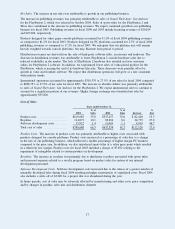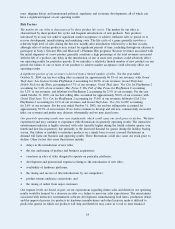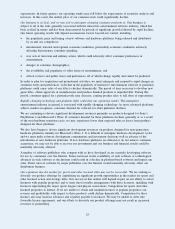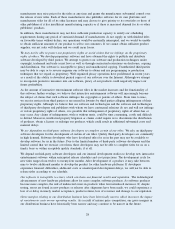2K Sports 2004 Annual Report Download - page 35
Download and view the complete annual report
Please find page 35 of the 2004 2K Sports annual report below. You can navigate through the pages in the report by either clicking on the pages listed below, or by using the keyword search tool below to find specific information within the annual report.
October 31, 2004 and 2003. For the year ended October 31, 2004, sales of our products to Wal-Mart
accounted for 10.4% of our revenues. Our sales are made primarily pursuant to purchase orders without
long-term agreements or other commitments. Our customers may terminate their relationship with us at any
time. The loss of our relationships with principal customers or a decline in sales to principal customers
could harm our operating results. Bankruptcies or consolidations of certain large retail customers could also
seriously hurt our business.
We are subject to credit and collection risks. Our sales are typically made on credit. We do not hold any
collateral to secure payment by our customers. As a result, we are subject to credit risks, particularly in the
event that any of our receivables represent sales to a limited number of retailers or are concentrated in foreign
markets. Although we continually assess the creditworthiness of our customers, which are principally large,
national retailers, if we are unable to collect our accounts receivable as they become due, it could adversely
affect our financial condition.
Rating systems for interactive entertainment software, potential legislation and consumer opposition could
inhibit sales of our products. Trade organizations within the video game industry require interactive
entertainment software publishers to provide consumers with information relating to graphic violence,
profanity or sexually explicit material contained in software titles, and impose penalties for noncompliance.
Certain countries have also established similar rating systems as prerequisites for sales of interactive
entertainment software in such countries. In some instances, we may be required to modify our products to
comply with the requirements of such rating systems, which could delay the release of those products in such
countries. Our software titles receive a rating of “E” (age 6 and older), “T” (age 13 and over) or “M” (age 17
and over). Most of our new titles (including our Grand Theft Auto titles, Max Payne 2: The Fall of Max
Payne, Manhunt and Mafia) have received an M rating. We believe that we comply with such rating systems
and properly display the ratings and content descriptions received for our titles.
Several proposals have been made for federal legislation to regulate the interactive entertainment software,
motion picture and recording industries, including a proposal to adopt a common rating system for interactive
entertainment software, television and music containing violence or sexually explicit material, and the Federal
Trade Commission has issued reports with respect to the marketing of such material to under-17 audiences.
Consumer advocacy groups have also opposed sales of interactive entertainment software containing graphic
violence or sexually explicit material by pressing for legislation in these areas (including legislation
prohibiting the sale of certain “M” rated video games to under-17 audiences) and by engaging in public
demonstrations and media campaigns. Retailers may decline to sell interactive entertainment software
containing graphic violence or sexually explicit material, which may limit the potential market for our “M”
rated products, and adversely affect our operating results. If any groups (including international, national and
local political and regulatory bodies) were to target our “M” rated titles, we might be required to significantly
change or discontinue a particular title, which in the case of our best selling titles could seriously hurt our
business. Although lawsuits seeking damages for injuries allegedly suffered by third parties as a result of
video games have been unsuccessful, a claim of this kind has been asserted against us.
We cannot publish our console titles without the approval of hardware manufacturers. We are required to
obtain a license from Sony, Microsoft and Nintendo, our principal competitors, to develop and publish titles
for their respective hardware platforms. Our existing hardware console platform licenses require that we
obtain approval for the publication of new titles on a title-by-title basis. As a result, the number of titles we
are able to publish for these hardware platforms, along with our ability to time the release of these titles
and, accordingly, our net sales from titles for these hardware platforms, may be limited. If any manufacturer
chooses not to renew or extend our license agreement at the end of its current term, or if the manufacturer
were to terminate our license for any reason, we would be unable to publish additional titles for that
manufacturer’s hardware platform. Termination of any such agreements would seriously hurt our business.
License agreements relating to these rights generally extend for a term of three or four years and are
automatically renewable for successive one-year terms. The agreements are terminable upon the occurrence
of a number of factors, including: (1) breach of the agreement by us; (2) our bankruptcy or insolvency; or
(3) our entry into a relationship with, or acquisition by, a competitor of the manufacturer. We cannot assure
you that we will be able to obtain new or maintain existing licenses on acceptable terms, or at all.
Sony and Nintendo are the sole manufacturers of the titles we publish under license from them. Games for the
Xbox must be manufactured by pre-approved manufacturers. Each platform license provides that the
27
























